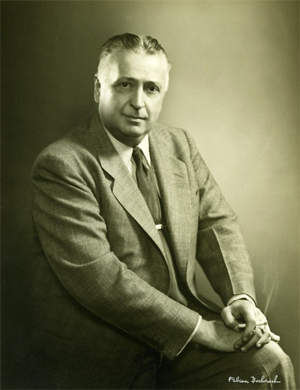 Paul M. Angell was born in Michigan in the last years of the nineteenth century, growing up in Ottumwa, Iowa. His formal education ended with sixth grade. In 1916 he joined the U.S. Navy. A gifted musician, he was assigned to John Philip Sousa’s band and spent the rest of World War l touring the country with the band, raising morale and selling war bonds. He survived the 1918 flu pandemic that decimated the troops at the Great Lakes Naval Training Center, served in Santo Domingo during the U.S. occupation of the Dominican Republic, then left the service and joined his father, now back in Michigan, as a construction contractor.
Paul M. Angell was born in Michigan in the last years of the nineteenth century, growing up in Ottumwa, Iowa. His formal education ended with sixth grade. In 1916 he joined the U.S. Navy. A gifted musician, he was assigned to John Philip Sousa’s band and spent the rest of World War l touring the country with the band, raising morale and selling war bonds. He survived the 1918 flu pandemic that decimated the troops at the Great Lakes Naval Training Center, served in Santo Domingo during the U.S. occupation of the Dominican Republic, then left the service and joined his father, now back in Michigan, as a construction contractor.
With the onset of the Great Depression, there was very little new construction, so he went on to start up a number of small businesses. In 1932, he moved to Chicago and founded a small firm to market and manufacture a novelty food item, the ice cream cake roll. Throughout that difficult period and on through World War II, he persevered while raising nine children. The firm, Newly Weds Foods, Inc., has gone on to be a global leader in its field, with 25 manufacturing facilities in 10 countries around the world. In 1984 he died at the age of 85.
Angell’s life encompassed nearly a century wherein our country went from the horse drawn wagon to landing on the moon. It fought two world wars and experienced its worst economic downturn while evolving from the telegraph to the internet. The nation, through good and bad, transformed itself from an isolationist, rural, agricultural economy to an urban, manufacturing, world power.
His story could be described as unexceptional in such exceptional times. Yet the profound, formative influences of those titanic events had deep seated effects on those who experienced them. For Angell, it no doubt strengthened his underlying ethos of hard work, self reliance, fairness and an unrelenting feeling of urgent optimism.
This foundation is intended to honor him and his ideals by endowing organizations and activities that are emblematic of his character and sensitive to his concerns in the certain knowledge that change for the better in society is best gained through the constructive involvement of its individual citizens.